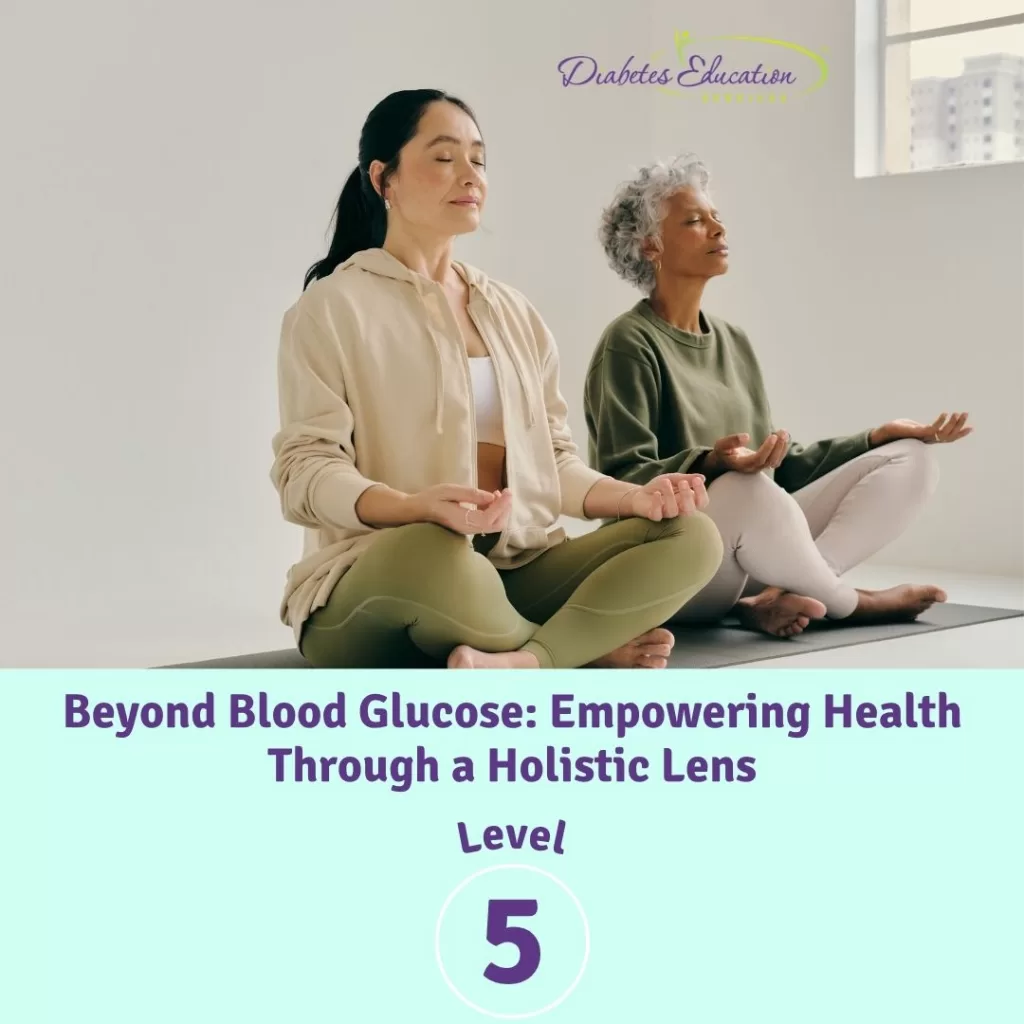
In today’s fast-paced, tech-forward medical world, we’ve made incredible strides in diabetes management—continuous glucose monitors, automated insulin delivery systems, and smart dosing algorithms. But amidst this progress, something vital is often overlooked: the person behind the diagnosis.
That’s where holistic care comes in.
What Is Holistic Care?
“Holistic” has become a bit of a buzzword lately—often evoking images of spa treatments, essential oils, or acupuncture needles. But at its core, holistic care is much simpler and more profound. It means supporting the whole person—not just a diagnosis or set of symptoms. It’s about understanding the interconnectedness of body, mind, environment, and lifestyle, and recognizing that true healing requires addressing all of these layers.
In holistic care, we recognize the body’s innate ability to heal itself when given the right conditions—adequate rest, nourishment, connection, and movement. Rather than just reacting to symptoms, holistic practitioners aim to restore balance and strengthen the body’s foundation, from the ground up.
In many cases, the healthcare system we work in tends to focus on disease management rather than actual health and healing. Managing symptoms, prescribing medications, and performing procedures are often necessary—and can be life-saving—but they’re just one part of the picture. Holistic care does not replace conventional medicine, it complements it by focusing on the why behind the symptoms and empowering people living with diabetes to take an active role in their well-being.
Why Approach Diabetes Holistically?
The simple truth? It doesn’t work any other way. Real health care has to be holistic—because human beings are holistic. We’re not just blood glucose readings or lab values; we’re a complex blend of body, mind, emotions, thoughts, and even spirit. When we focus only on the numbers, we risk overlooking 99% of the person sitting in front of us.
Diabetes care, in particular, is uniquely suited to a holistic approach. It’s a condition shaped not just by biology, but by lifestyle, environment, sleep, stress, and social factors—many of which can’t be solved with medication alone. And while innovations in technology and therapeutics are incredible tools, they often become expensive “Band-Aids” unless they’re paired with strategies that build health from the inside out.
What Does Taking a Holistic Approach Look Like?
Holistic care doesn’t mean ditching science or abandoning evidence-based practice. It simply means zooming out—expanding our perspective and staying open to the full context of a person’s life. For practitioners, it’s often more of a mindset shift than a change in tools. Thinking holistically invites us to pause and ask deeper questions like:
🩺 What does this person’s body need to heal, not just manage blood glucose?
🌿 What’s happening in their lifestyle, stress levels, relationships, or environment that might be influencing their blood glucose?
🧠 Are we supporting the health of the whole person, not just treating the symptom?
🍎 Does this person have access to nutritious food or safe spaces to exercise?
🧳 Are they carrying the weight of adverse childhood experiences (ACEs)?
🪞 Is this person’s mindset or beliefs about their health holding them back from improving?
The goal isn’t to replace conventional tools—but to strengthen the foundation beneath them. As practitioners, these questions help us connect the dots between physiology, psychology, and lived experience—especially when working with marginalized populations disproportionately affected by diabetes and its complications.
It’s Not All or Nothing
Some healthcare professionals hesitate to embrace holistic care because it feels like a totally different world—outside the bounds of what we were taught in school or what we have time to address in a 20-minute visit. But this doesn’t have to be an all-or-nothing shift.
You don’t need fancy certifications or to leave your clinic to practice holistically. You can integrate holistic thinking into your everyday work with individuals by listening more deeply, validating lived experiences, and supporting foundational lifestyle changes—even in small ways.
And if that still feels out of reach? Let me remind you: there is a holistic practitioner inside of you. Whether you’re just beginning to explore this space or have been weaving in integrative tools for years, simply being curious about the whole person already puts you on the path.
A Call to Expand Our Perspective
As diabetes professionals, we have an opportunity—and a responsibility—to widen our scope. Learning the tenets of holistic care doesn’t just help us become more well-rounded clinicians; it helps us better understand the people we serve. Exploring other modalities, understanding root-cause approaches, and appreciating the interconnectedness of body and mind allows us to offer more personalized, compassionate, and effective care.
As a CDCES who splits time between a busy endocrinology clinic and holistic practice myself, I’ve seen firsthand the difference this integrated lens makes. When we treat the person, not just the pancreas, outcomes improve—and so does quality of life.
Holistic care isn’t about abandoning what works—it’s about expanding what’s possible.
If you’re interested in gaining a deeper understanding of holistic care—its core principles, supporting modalities, and how it can complement your clinical work—I’d love to see you at my upcoming webinar Beyond Blood Glucose: Empowering Health Through a Holistic Lens on July 24th. Whether you’re curious about this approach or ready to begin integrating it into your practice, this session will offer valuable insight and practical tools. Hope to see you there!
Advance With Purpose & Deepen Your Impact

Join us live on July 24th, 2025, at 11:30 am PST to watch our brand new webinar, Beyond Blood Glucose: Empowering Health Through a Holistic Lens by Nick Kundrat, BS, CEP, CDCES, LMT
Despite the rise of cutting-edge diabetes technologies and therapeutics, many people with diabetes still struggle with fatigue, blood glucose swings, and burnout. Why? Because we’re often so focused on managing diabetes itself that we often forget to take care of the human being who lives with it.
Join Nick Kundrat, CDCES and Integrative Health Practitioner, for an engaging webinar where he simplifies the often-misunderstood world of holistic health. You’ll learn practical, accessible strategies to begin thinking more holistically and discover simple, effective tools that enhance conventional care and empower people with diabetes to thrive—physically, emotionally, and spiritually.
Drawing from over two decades of lived experience with type 1 diabetes and years of supporting clients in both clinical and holistic settings, Nick offers a unique perspective on diabetes care focused on the whole person. Through reconnecting with the foundational elements of health, which are often overlooked in conventional diabetes care, Nick aims to equip you with actionable strategies to help people with diabetes restore their energy, support their bodies, and thrive beyond diabetes.
Course topics:
Understanding the Holistic Mindset:
Explore what it means to think holistically in diabetes care and how adopting this mindset can transform your approach to supporting people with diabetes beyond blood glucose and lab values.Foundations of Health: Back to Basics:
Discover simple, low-cost, high-impact strategies rooted in foundational health principles that are vital to improving people with diabetes’ energy, resilience, and overall well-being.Evaluating Popular Holistic Approaches:
Gain insight into common holistic methods and modalities—what’s effective, what’s overhyped, and how to integrate complementary therapies safely alongside conventional care.








